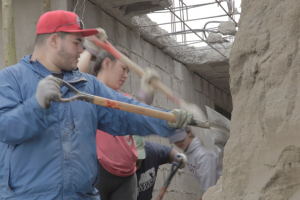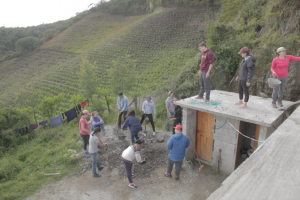 Now in our second year of a partnership with the Lampert Institute for Civic and Global Affairs, we have sent three groups of students to the Tandana Foundation, a nonprofit organization in Ecuador. This year’s trips occurred in January and May and were funded by a combination of COVE, Lampert, and Karelsie Foundation grant money.
Now in our second year of a partnership with the Lampert Institute for Civic and Global Affairs, we have sent three groups of students to the Tandana Foundation, a nonprofit organization in Ecuador. This year’s trips occurred in January and May and were funded by a combination of COVE, Lampert, and Karelsie Foundation grant money.
In January 2018, a group of 10 Colgate students and two co-directors, Danny Barreto (LGBTQ Studies) and his partner Paul Humphrey, a professor of Spanish at Monmouth University and specialist on Afro-Latin American religions, participated in a two-week service-learning trip to Otavalo, Ecuador. They stayed in the small, agrarian community of Muenala, approximately an hour outside of the city. The theme of the trip, in keeping with wider campus programming for 2017–18, was “Spiritual Ecologies,” which allowed for learning about the ways in which sustainability, foodways, and traditional spiritual beliefs are mutually informed in this community. They also supported the community of Muenala in renovating and expanding their casa comunal (community center), of which there is increased use since the recent closing of the local school.
Barreto wrote of the experience, “In Muenala, the group worked alongside community members towards the completion of their building project. We were delegated the less-skilled tasks of shoveling, mixing cement, filling potholes, and moving supplies. The most important part of this project was working in a traditional organization known as a minga, in which communities work in shifts on a project of communal importance. This afforded us time with community members beyond the host families that students stayed with, and allowed for sustained collaboration and conversation over the two weeks.
 “On most afternoons, the organizers from Tandana had prepared a series of cultural events closely related with the theme of our trip. Within the first couple of days of arrival in Muenala, we were offered a physical and spiritual cleansing to welcome us to the sacred land, which was performed by a traditional healer who explained a number of local customs. Later in the trip, we were taken to Pakarinka, a cultural collective dedicated to the preservation of local Kichwa customs, where we were informed about local farming habits, herbal medicines grown on the property and participated in spiritual and medical rituals, such as diagnosing and healing ills using plants, eggs, and guinea pigs. While there, we prepared and ate a meal cooked in the ground using hot volcanic rocks, a tradition known as pachamanka, which is usually reserved for the four major holidays in Kichwa culture that coincide with the equinoxes and solstices. Midway between these two visits, we were given a class in the Kichwa language as well as Kichwa cosmovisión or worldview. After each of these and other events, there was time for reflection led by the co-directors and Tandana staff. Importantly, the structure of the program allowed for continued learning and increasingly complex conversations about the interactions between spirituality and ecology, both in Highland Ecuador and other areas of the world with which the students were familiar.
“On most afternoons, the organizers from Tandana had prepared a series of cultural events closely related with the theme of our trip. Within the first couple of days of arrival in Muenala, we were offered a physical and spiritual cleansing to welcome us to the sacred land, which was performed by a traditional healer who explained a number of local customs. Later in the trip, we were taken to Pakarinka, a cultural collective dedicated to the preservation of local Kichwa customs, where we were informed about local farming habits, herbal medicines grown on the property and participated in spiritual and medical rituals, such as diagnosing and healing ills using plants, eggs, and guinea pigs. While there, we prepared and ate a meal cooked in the ground using hot volcanic rocks, a tradition known as pachamanka, which is usually reserved for the four major holidays in Kichwa culture that coincide with the equinoxes and solstices. Midway between these two visits, we were given a class in the Kichwa language as well as Kichwa cosmovisión or worldview. After each of these and other events, there was time for reflection led by the co-directors and Tandana staff. Importantly, the structure of the program allowed for continued learning and increasingly complex conversations about the interactions between spirituality and ecology, both in Highland Ecuador and other areas of the world with which the students were familiar.
“Colgate hired a local director and photographer, Alberto Muenala, to serve as a photographer on the work site for two days. On one of those evenings, we arranged a screening of Killa, the first Kichwa-language film, for the students and community at the casa comunal, which allowed us to share our experiences and perspectives with the community. Their excitement upon seeing their culture and language represented positively on screen, as well as their comments on the usual racist stereotypes of Kichwa people and culture that circulate in Ecuador, were useful for helping students understand the film, and confirmed for us that hiring a local photographer was the appropriate thing to do. While we inevitably learned so much from them when compared with the little labor we could give, this time with the community allowed for more equitable and meaningful mutual exchange that is key to successful service-learning experiences.
“Not only did this trip allow the students to form deep relations with the community of Muenala and staff of Tandana, it also allowed them to form a close community with each other. The 10 students were drawn from a range of ethnic and socioeconomic backgrounds, class years, and majors. This experience allowed them to not only challenge stereotypes about service learning, indigenous communities, and rural societies, but also about each other, which led to interesting conversations about the nature of community on campus and how we might reimagine social relations at home. In addition to these new insights, leaving the classroom and engaging in this service-learning trip allowed us to think in innovative and complex ways about how knowledge is created and transmitted, the relationship between place and identity, and who gets to create and impart knowledge. Given the conversations and reflections during those two weeks, there is clear reason to believe this experience will have an ongoing impact on the students’ coursework, career paths and social relationships during their remaining time at Colgate and beyond.
“The next trip is occurring as I write this and is being led by Cory Duclos, director of the Keck Language Center and Pilar Mejía-Barrera, senior lecturer in Spanish. The current trip’s theme is Agency, Movements and Identities in Otavalo, Ecuador. Nine students are participating. We look forward to a long, positive partnership in Otavalo.”

